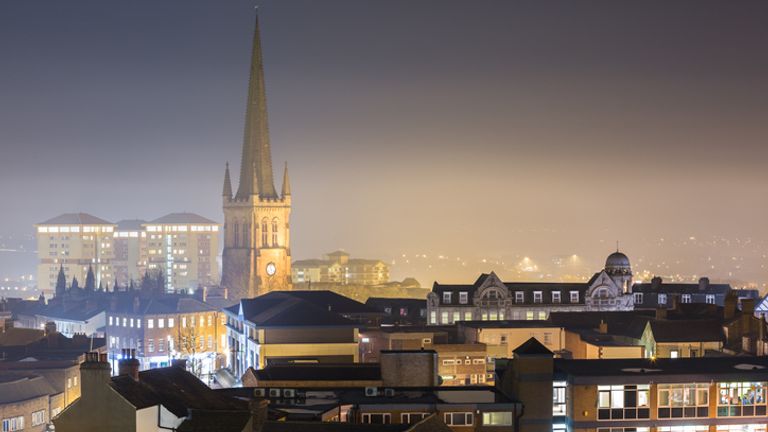Councils in England now have extra powers to impose shutdowns if clusters of coronavirus appear – but central government will step in if local authorities don’t go far enough or act fast enough, Grant Shapps has told Sky News.
From today, councils can close specific premises, shut public outdoor spaces and cancel events.
Prime Minister Boris Johnson said the powers would “enable local authorities to act more quickly in response to outbreaks where speed is paramount”.
Mr Shapps, the secretary of state for transport, told Sky News: “They will have the powers and they will be able to act immediately, wherever that’s required… but the powers will be there, which is a change in order to make these things happen faster and be more responsive to the position on the ground.”
But he added: “Ultimately, government has ultimate power and control.”
It comes amid concerns around two areas where the number of coronavirus cases are rising: Wakefield in West Yorkshire and Burton in Staffordshire.
Sky News’ Fraser Maude, who is in Wakefield, said the council insists the overall figures are relatively low.
“They don’t believe that they’re anywhere near implementing any of the lightning lockdowns which have now been approved by the PM,” he said. “But people are being urged to protect themselves.”
Wakefield is now registering 20 new cases per 100,000 of population – up from 14.
There are three “mini hotspots”: a meat factory in the city where 17 people have tested positive; a factory where four people have tested positive; and a centre for asylum seekers where there have been 20 reported cases.
Wakefield’s director of public health, Anna Hartley, said the government’s data-gathering technology had improved and the council was “absolutely on top of it”.
She said they now had “a very comprehensive early warning system which not only looks at postcode data but also phone calls to GPS. We even track social media coverage on that”.
Manchester’s mayor, Andy Burnham, has also called on the government to share more detailed information so further local lockdowns can be avoided.
“We do need better data from the government and I’ve been making the argument for some time that we need named patient data and we’re not getting that at the moment,” he told Sky News.
Mr Burnham added: “The government needs to give us all the tools we need to act quickly to prevent the worst case scenario which is a local lockdown like we’ve seen in Leicester…
“A postcode can point you to a general area, a name takes you directly to the source of the outbreak – and that enables people to act more effectively on the ground.”
Next week, the prime minister will give details on extra powers for central government that will allow parliament to close factories and entire sectors of the economy in specific regions.
The powers will include enforcing stay-at-home orders, preventing people entering or leaving areas, closing roads, restricting public transport and reducing the maximum size of gatherings.
In a tweet today, Mr Johnson said: “Action by local councils will not always be sufficient, so next week we will publish draft regulations explaining how central government can intervene at a local level.”
He added: “It has to be right that we take local action in response to local outbreaks – there is no point shutting down a city in one part of the country to contain an outbreak in another part of the country.”
:: Listen to the Daily podcast on Apple Podcasts, Google Podcasts, Spotify, Spreaker
Mr Johnson hailed successes in Weston-super-Mare and Kirkless after outbreaks at specific premises; in Bradford, Blackburn and Darwen where he said testing was increased; and in Leicester where he said rates of infection had been “stubborn”.
It comes as the row over how the lockdown in Leicester and some surrounding areas was imposed, with very little advance notice.
The city’s Labour mayor has accused the government of penalising businesses and residents in a city that predominantly votes Labour.
The rate of new coronavirus cases per 100,000 population in Leicester dropped from 126.1 in the seven days to 7 July to 92.9 in the seven days to 14 July, according to data published on Friday.
NHS figures on Saturday recorded another 13 coronavirus hospital deaths in England.
The Department for Health has said it is “pausing” daily death figures for the whole of the UK after Health Secretary Matt Hancock ordered a review into claims there were “statistical flaws”.


